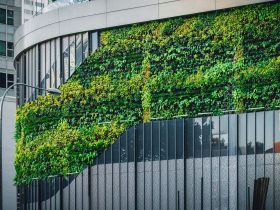As we journey through the landscape of ethical spendings, it’s imperative to pause and focus our binoculars on the vibrant terrain of real estate investments. Often considered a somewhat elusive territory, the intersection of ethical principles and real estate can appear foggy at first glance. However, armed with the right knowledge and a good dose of wit, one can navigate these waters to find sustainable and morally sound investments that not only yield financial returns but also contribute to a more conscientious world. So, buckle up, fellow ethical spenders, as we delve into the nooks and crannies of evaluating the long-term sustainability of ethical real estate investments.
When it comes to ethical real estate investments, the primary focus revolves around two crucial aspects: environmental impact and social responsibility. Let’s break down each of these elemen

ts and understand how they play a pivotal role in ensuring the long-term sustainability of your investment portfolio.
Environmental Impact: Building Green and Beyond
Picture this: a world where every brick laid is infused with sustainability, where each window invites natural light to dance through the rooms, and where rooftops are adorned with thriving gardens. This isn’t a scene from a utopian movie, but rather the forefront of sustainable real estate development.
Investing in properties that adhere to green building practices is not just a fad; it’s a wise move for a better future. Structures that incorporate energy-efficient designs, utilize renewable energy sources, and implement water-saving mechanisms are not only environmentally friendly but also cost-effective in the long run. Imagine owning a building that boasts solar panels, rainwater harvesting systems, and smart technology regulating energy consumption. It’s a win-win situation: a win for your conscience and a win for your pocket!
One exemplary case in point is the Bullitt Center in Seattle, Washington. This architectural marvel stands tall as a testament to the prowess of sustainable design. With features like composting toilets, a solar panel-clad roof, and an emphasis on natural lighting, the Bullitt Center stands as a beacon of hope in the realm of sustainable real estate development.
Social Responsibility: Building Communities, Not Just Structures
Ethical investments aren’t just about the materials used in construction; they extend to the impact on the community and society at large. Investing in properties that foster inclusivity, promote community engagement, and support local businesses can significantly contribute to the social fabric of a neighborhood. It’s about creating spaces that people are proud to call home, where diversity is celebrated, and where the well-being of the community is a top priority.
Consider the success story of the Serenbe community in Chattahoochee Hill Country, Georgia. This sustainable community is a living example of how real estate investments can be a catalyst for positive social change. With a focus on organic farming, walkable neighborhoods, and fostering a sense of belonging, Serenbe stands as a testament to the power of ethical real estate in building not just structures, but vibrant, cohesive communities.
The Financial Gains: Aligning Ethical Values with Profitable Returns
While the ethical compass guides our decisions, it’s crucial to acknowledge that sustainable real estate investments can also yield profitable returns. Contrary to the misconception that ethical investments come at the cost of financial gains, the reality often paints a different picture. With the increasing demand for sustainable properties and the rise in environmentally conscious consumers, the value of ethical real estate is on a steady incline.
Take the example of the LEED-certified buildings in major cities across the United States. These properties not only boast reduced operational costs due to their energy-efficient designs but also witness higher occupancy rates and increased market value. This convergence of ethical practices and financial prosperity highlights the fact that making responsible choices doesn’t necessarily mean compromising on your investment returns.

Navigating the Pitfalls: Due Diligence and Beyond
While the path to ethical real estate investments may seem paved with roses, it’s crucial to tread cautiously and navigate the possible pitfalls. Conducting thorough due diligence on the developer’s track record, the property’s adherence to sustainability standards, and the local regulatory environment can safeguard your investment from potential risks.
Consider the cautionary tale of the Elysian Building Project in a bustling metropolis. What seemed like a promising venture in sustainable luxury condominiums turned into a legal quagmire due to alleged violations of environmental regulations and poor construction quality. Learning from such unfortunate instances, it becomes evident that a meticulous examination of all aspects, from the developer’s reputation to the property’s compliance with sustainability norms, is paramount in ensuring a secure and ethically sound investment.
Looking Ahead: A Sustainable Future Beckons
As we unravel the layers of ethical real estate investments, one thing becomes crystal clear: the future is green, both in terms of sustainability and profitability. The shift towards conscious living is no longer a fleeting trend but a fundamental shift in the way we perceive our surroundings and our responsibilities towards the planet and its inhabitants.
Embracing the ethos of sustainability and social responsibility within the realm of real estate investments not only secures a stable financial future but also contributes to a world where ethical principles and profitability coexist harmoniously. So, let’s raise our glasses to a future where every brick laid is a testament to our commitment to a more sustainable and inclusive world.
In conclusion, when evaluating the long-term sustainability of ethical real estate investments, remember to look beyond the concrete and steel, and focus on the impact these investments have on the environment, the community, and your conscience. After all, the true measure of success lies not just in the figures on the balance sheet but in the legacy we leave behind for generations to come. Cheers to a future where ethical investments build not just properties, but a better world for all.
































